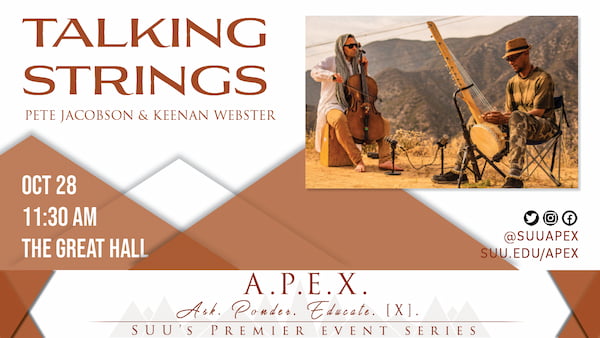
Eccles Visiting Scholar ![]()
SUU and A.P.E.X. Events is most grateful for the support from The George S. and Dolores Doré Eccles Foundation which made this event possible.
Peter "Pete" Jacobson is a cellist, producer, songwriter-singer, chamber musician, teacher, and father. In 2013 he won a Grammy for Best Latin Rock Alternative or Urban Album as a member of the group Quetzal.
Mr. Jacobson has recorded cello for Dr. Dre and frequently plays in the San Diego Symphony. He has been a soloist with Kamasi Washington and the West Coast Get Down and has toured the world with Rhye. His solo cello can be heard in film and television, including The Walking Dead, Motherland, The Twilight Zone.
Pete has performed in the US, Mexico, Asia, Australia, the Middle East, and Europe. He studied with Eleonore Schoenfeld at USC as well as at Cal Arts and the San Francisco Conservatory of Music. Pete plays regularly with Rhye, the Arohi Ensemble, Sangam Sitar + Cello, Talking Strings, Quartetto Fantastico, the Hutchins Consort, and as a freelance cellist.
Keenan Webster is the Founder of Sankofa Africa. Born in Nashville, Tennessee. His love of music deepened as a teenager in Los Angeles, California, where he began his music studies with Master Teachers from Africa and Cuba. Surrounded by a highly spiritual family, he has spent his life focused on studies of music, religion and history.
He is influenced by music giants John Coltrane, Miles Davis, Taj Mahal, El Hadj Kouyate, Toumani Diabate, Robert Johnson, Slip James, Johnny Shines, Habib, Koite, and Keltigue Diabate. The music traditions of Latin America, Sumatra, and India also infiltrate his style.
Keenan performs the 21 string kora (11 played by the left hand and 10 by the right), a large calabash cut in half and covered with cow skin with a long, hardwood neck. Strings were traditionally made from thin strips of hide, for example, antelope skin – now most strings are made from harp strings or nylon fishing line.
Reflection
Talking Strings — featuring Keenan Webster and Pete Jacobson — performed music for SUU’s APEX event on October 28. Webster and Jacobson first started playing together just six months ago. Jacobson is a Grammy award winner and Webster is a specialist in West African instruments.
APEX director, Lynn Vartan, explained in her introduction that this is “usually a lecture series with a lot of words — today is as little words as possible. We want to talk about the language of music. The language of sound and music and what the spirit of music can do to us. Today will be an expansive exploration of connection in music and the power of collaboration between sounds.”
Vartan told the audience to “just relax after midterms. Let this music wash over you. It is almost trance-like. Let music take you wherever it is going to take you.”
Webster played multiple instruments during the performance, primarily the Kora and Kamele n'goni. The Kora has 21 strings (11 played by the left hand and 10 by the right), a large calabash cut in half and covered with cow skin with a long, hardwood neck. The Kamele n'goni is a string instrument and the traditional guitar of Malia which is made from goat skin.
The particular Kora which Webster played is one of the three electric Kora’s in the world. The electric version is modeled after the electric guitar.
Playing Indian Raga during the event, Jacobson expressed, “Raga is that which colors the mind. A certain feeling that is evoked from a combination of pitches. It’s a sort of a melodic form as it goes up and down.
Further explaining Raga, Jacobson said that “a raga is not a scale. A raga has a very definitive motion between those notes. Raga is a really nuanced thing and it takes a long time to learn. Raga is not a written thing. It's an aural tradition. It is too nuanced to actually write in western notation. You must learn by the ear.”
Jacobson continued that the “tradition of the music [of Raga] is based off of these mystics and people who would spend a lifetime learning the science of these things.”














































